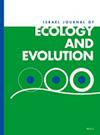Spatial and species-level metrics reveal global patterns of irreplaceable and imperiled gecko phylogenetic diversity
IF 0.8
4区 环境科学与生态学
Q3 ECOLOGY
引用次数: 6
Abstract
Phylogenetic Diversity (PD) is increasingly recognised as a useful tool for prioritising species and regions for conservation effort. Increased availability of spatial and phylogenetic data for reptiles now facilitates their inclusion in phylogenetically-informed conservation prioritisation efforts. Geckos are a highly divergent and diverse clade that comprises almost 20% of global reptile diversity. Their global distribution is coincident with numerous anthropogenic threats, making them worthy of conservation prioritisation. Here, we combine phylogenetic, spatial distribution and extinction risk data for geckos with global human encroachment data to identify both regions and species representing irreplaceable gecko diversity at risk from human pressure. We show that high levels of irreplaceable gecko diversity are restricted to regions under intense human pressure, such as India, Sri Lanka and the Caribbean. There is a lack of extinction risk data for the western regions of Angola and Namibia, and yet these regions harbour high levels of irreplaceable diversity. At the species level, geckos display more unique PD than other lizards and snakes and are of greater conservation concern under our metric. The PD represented by Data Deficient geckos is at comparable risk to that of Endangered species. Finally, estimates of potential gecko diversity loss increase by up to 300% when species lacking extinction risk data are included. Our analyses show that many evolutionarily unique gecko species are poorly known and are at an increased risk of extinction. Targeted research is needed to elucidate the conservation status of these species and identify conservation priorities.空间和物种水平的指标揭示了不可替代和濒危的壁虎系统发育多样性的全球格局
系统发育多样性(PD)越来越被认为是确定物种和区域优先保护的有用工具。爬行动物空间和系统发育数据的可用性增加,现在有助于将它们纳入系统发育知情的保护优先工作中。壁虎是一个高度分化和多样化的分支,占全球爬行动物多样性的近20%。它们的全球分布与许多人为威胁同时发生,这使它们值得优先保护。在此,我们将壁虎的系统发育、空间分布和灭绝风险数据与全球人类入侵数据相结合,以确定受人类压力威胁的壁虎多样性不可替代的区域和物种。研究表明,高度不可替代的壁虎多样性仅限于人类压力较大的地区,如印度、斯里兰卡和加勒比地区。安哥拉和纳米比亚西部地区缺乏灭绝风险数据,但这些地区拥有高水平的不可替代的多样性。在物种水平上,壁虎表现出比其他蜥蜴和蛇更独特的PD,在我们的指标下更值得关注。以数据缺失壁虎为代表的PD与濒危物种的PD风险相当。最后,当缺乏灭绝风险数据的物种被包括在内时,对潜在壁虎多样性损失的估计增加了300%。我们的分析表明,许多进化上独特的壁虎物种鲜为人知,灭绝的风险也在增加。需要有针对性的研究来阐明这些物种的保护状况并确定保护重点。
本文章由计算机程序翻译,如有差异,请以英文原文为准。
求助全文
约1分钟内获得全文
求助全文
来源期刊

Israel Journal of Ecology & Evolution
环境科学-进化生物学
CiteScore
2.10
自引率
0.00%
发文量
7
审稿时长
>36 weeks
期刊介绍:
The Israel Journal of Ecology and Evolution includes high-quality original research and review papers that advance our knowledge and understanding of the function, diversity, abundance, distribution, and evolution of organisms. We give equal consideration to all submissions regardless of geography.
 求助内容:
求助内容: 应助结果提醒方式:
应助结果提醒方式:


